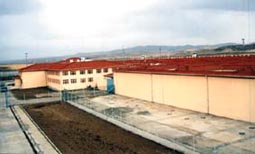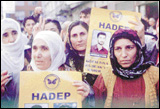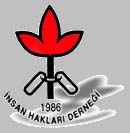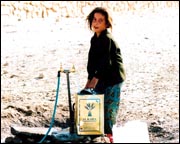30
May 2002
![]()
2. "'Berivan' to face DGM trial", State Security Court (DGM) has opened a case against a father, Tufan Akcan, for naming his third daughter, "Berivan" on charges of breaking a law barring parents from giving their children names that "do not fit our national culture, ethical laws, norms and traditions." A Turkish court, earlier, rejected charges brought against seven families who gave their children traditional Kurdish names.
3. "Pressure increases on Turkey over Council of Europe requirements", if Turkey refuses to take further steps for reforms, not only EU membership but also cooperation with the Council of Europe will be endangered, diplomats say.
4. "EUROPE: Greece adds to dispute on Turkey's role in EU force", Costas Simitis, prime minister of Greece, has raised the stakes in a dispute over the terms of Turkey's role in a planned European Union rapid reaction force, by securing support for his position from opposition political parties before today's Nato summit.
5. "Turkey warns the EU on ESDP inclusion", one of Turkey’s top military officials yesterday warned the European Union that peace and stability can be established through Europe if and only if the European Security and Defense Policy (ESDP) includes all European countries.
6. "Schilly: Germany owes Turkey a great deal“, German Interior Minister Otto Schilly yesterday attended an awards ceremony organized by the Federation of German-Turkish Friendship Associations and gave important messages about relations between Turkey, Germany and Europe.
1. - Turkish Daily News - "AI release its report 2002 on human rights violations":
30 May 2002
Amnesty International (AI) released its report 2002 on human rights
violations based on events during 2001. AI stressed that there were
human rights violations in 152 countries. In the report, in that a special
section separated for Turkey, the human rights violations continue.
The report, criticizing human rights violations because the implementation of F type prisons, said, "Thousands of prisoners were held in conditions of prolonged isolation, which could amount to cruel, inhuman or degrading treatment, while the debate surrounding the high security 'F-type' prisons intensified." The report also stressed the pressure on human rights defenders: "The pressure on human rights defenders increased: they faced harassment, death threats, arrests and prosecution, and branches of human rights associations were closed. Many people were imprisoned for exercising their right to freedom of expression, particularly when they expressed opinions on the Kurdish question, the 'F-type' prisons or the role of Islam. Torture in police custody remained widespread and was practised systematically, while the perpetrators were rarely brought to justice. Two Kurdish politicians 'disappeared' in gendarmerie custody. Dozens of political killings were reported, some of which might have been extrajudicial executions. The de facto moratorium on executions was upheld."
The report also stressed the insufficiency of steps taken due to the national program prepared by the Turkish government for the adaptation to the European Union. Pointing out amendments have not included significant safeguards against torture, the report stressed, "In March, Turkey outlined a national program of steps to be taken to meet the conditions set out in December 2000 for starting negotiations to join the European Union. Turkey decided to give priority to a review of the 1982 Constitution, which was adopted when the country was under military rule. While some restrictions on fundamental human rights were lifted, new restrictions were introduced that fell short of Turkey's international obligations. The amendment did not include significant safeguards against torture, and the death penalty was abolished for some offences only. A number of promised legal reforms were initiated. New governmental human rights bodies were established. However, there was no major improvement in the human rights record."
Mentioning the death penalty, the report stressed, "The de facto moratorium on executions was upheld. However, at least 24 death sentences were passed in 2001; four were later commuted to prison terms. The constitutional amendment on Oct. 3 stated that the death penalty 'cannot be imposed except in times of war, imminent threat of war and for terrorist crimes'. Of the 117 prisoners whose death sentences had been upheld by the Appeal Court and who can be executed upon parliamentary approval, at least 73 were sentenced under 'anti-terrorist' legislation."
Talking about the Kurdish problems and pressure on Kurdish people in Southeastern Turkey, the report said, "The armed conflict between government forces and the Kurdistan Workers' Party (PKK) effectively came to an end in 1999, but there were still some clashes between the Turkish army and PKK groups. Repression of political parties and organizations in the mainly Kurdish Southeast continued. Numerous representatives of the legal pro-Kurdish People's Democracy Party (HADEP) were arrested and put on trial. People were restricted from publicly expressing their Kurdish identity. Demonstrations, meetings and other public events were banned, increasingly so following the attacks in the United States on Sept. 11. Numerous media outlets were closed temporarily. The Islamic-oriented Fazilet Partisi (Virtue Party) was banned in June."
Torture and ill-treatment in Turkey
The report emphasized that torture was widespread and practised systematically. "There were numerous reports of torture and ill-treatment of men, women and children, mainly from western cities, the Southeast and the region around Adana in the south. Many of the victims were political activists including supporters of leftist, pro-Kurdish and Islamist groups. Despite intimidation and fear of reprisals, several allegations of torture were made by people arrested on criminal charges. Other alleged victims of torture and ill-treatment included Kurdish villagers, relatives of political activists and trade unionists. Allegations were also received from people alleged to be leading figures in organized crime. Reports indicated that those suspected of theft and burglary - among them many children - continued to be systematically beaten in detention. In some cases, torture appeared to be linked to discrimination on the basis of sex, sexual orientation or ethnicity," said in the report.
According to the report, officers accused of torture were rarely suspended from duty, and in some cases received promotions. The report stressed, "Doctors who documented torture were often harassed. The intimidation of victims, witnesses and a generalized climate of fear also contributed to impunity, as did prosecutors' reluctance to investigate security officials. Statements reportedly extracted under torture were placed in court records and judges often refused to investigate allegations of torture."
High security prisons: F Type 
Claiming that high security prisons bring out human rights violations,
the report said, "Isolation in prisons continued to be a subject
of intense debate. The authorities continued to build 11 'F-type"
prisons and new wings to existing prisons in which dormitories were
replaced with smaller cells. Thousands of inmates of six 'F-type' prisons
already in use were kept in prolonged solitary confinement or small
group isolation, which could amount to cruel, inhuman or degrading treatment.
Although Article 16 of the Anti-Terrorism Law was amended in early May
to allow prisoners to receive unobstructed visits and to participate
in communal activities, the law did not ensure that prisoners spent
adequate time in communal areas. AI received numerous reports of ill-treatment
in 'F-type' prisons, but they were difficult to verify because of the
restricted access to these prisons. By the end of the year, 42 people
had died as a result of a hunger strike against these prisons."
Rape in custody
The report also points out that reports of rape and sexual assault by members of the security forces continued: "During incommunicado detention in police or gendarmerie custody, women and men were routinely stripped naked. Methods of sexual abuse reportedly included rape, electric shocks and beating on the genitals and women's breasts. By the end of 2001, 147 women, 112 of them Kurds, had sought help from a legal aid project in Istanbul set up in 1997 to bring perpetrators to justice. Fifty-one of the women alleged they had been raped; the rest reported other forms of sexual torture. The suspected perpetrators were overwhelmingly police officers, although allegations were also made against gendarmes, soldiers and village guards. Only one was convicted."
Two HADEP politicians 'disappeared' 
Drawing attention to the 'disappearance' under custody, the report
said, "Serdar Tanis and Ebubekir Deniz, both representatives of
HADEP, 'disappeared' after being summoned on Jan. 25 to the gendarmerie
station in Silopi, Sirnak province. After initially claiming that the
two men had not been detained, the authorities later stated that they
had been released after 30 minutes. In March the authorities announced
that they had confiscated a letter indicating that the two men had been
abducted by the PKK and were being held in a camp in northern Iraq.
There were grave doubts about the authenticity of the letter and its
account of events. Before his 'disappearance,' Serdar Tanis had been
threatened repeatedly by the local gendarmerie commander and warned
to give up his party activities."
The report also underlines the contradiction between the implementations in Emergency Rules Region (OHAL) and other regions. "There were increasing numbers of reports about police and gendarmerie detention of political activists in Diyarbakir for several weeks or months, although the maximum permitted in Turkish law was seven days (10 under the state of emergency)."
Increased pressure on human rights defenders 
It is stressed in the report, that human rights defenders continued
to face harassment and intimidation. "Branches of the Human Rights
Association (IHD) remained forcibly closed indefinitely and others were
closed temporarily. Members of staff were detained for short periods.
Lawyer and human rights defender Eren Keskin, head of the IHD branch
in Istanbul and a founder of the Legal Aid Project for sexually tortured
women, went on trial for 'insulting the Turkish army', after her description
of the sexual torture suffered by members of a Kurdish women's group
known as the Peace Mothers was published in the newspaper Yeni Gundem
(New Agenda).
Many people, including writers, journalists, trade unionists,
local and national politicians, religious leaders and human rights defenders,
continued to be imprisoned or tried for exercising their right to freedom
of expression, particularly on issues related to the Kurdish question,
the 'F-type' prisons or the role of Islam. Some of them benefited from
a law on conditional releases, but others were excluded. ![]()
2. - Turkish Daily News - "'Berivan' to face DGM trial":
ANKARA / 30 May 2002
State Security Court (DGM) has opened a case against a father, Tufan
Akcan, for naming his third daughter, "Berivan" on charges
of breaking a law barring parents from giving their children names that
"do not fit our national culture, ethical laws, norms and traditions."
A Turkish court, earlier, rejected charges brought against seven families who gave their children traditional Kurdish names.
Prosecutors in the town of Dicle in the largely Kurdish southeast had brought a case against the families in March for giving 23 children names such as Serhat, Baran, Rodja and Zelal.
But judge Sirvan Erteken threw the case out Tuesday, saying that some of these Kurdish names were common names in Turkey, the daily Radikal reported Wednesday. Erteken told the families they did not have to rename their children.
Prosecutors argued that the rebel Kurdistan Workers Party, or PKK, used these names as code names for its members, and demanded that the families rename their children.
Firat Anli, a lawyer for the families, said that the names did not harm Turkey's national customs and traditions.
Berivan is a name of a popular tv series and a song Father Akcan said on Wednesday that he named his daughter after the heroine of a popular television series, "Berivan" because they love Sibel Can, the leading actress of the series and also a singer who sang the song, "Berivan."
Berivan, the title of a popular television series was among the banned names.
The government has drawn up a list of banned Kurdish names, and has ordered local officials to curb the use of Kurdish place names. Kurds often complain that Turkish authorities in the southeast change Kurdish names for Turkish ones when issuing birth certificates for Kurdish babies.
Turkey fought a 15-year war against the autonomy-seeking PKK. The fighting has slowed since the terrorists declared a unilateral cease-fire in 1999, but sporadic clashes continue. The conflict has left 37,000 dead since 1984.
Turkey, which is seeking membership in the European Union, is under increasing pressure from the group to grant cultural rights to Kurds. The government is apparently considering relaxing bans on broadcasting and education in Kurdish, in an effort to advance its membership bid.
Turkey has argued that granting special rights to its
estimated 12 million Kurds could arouse ethnic tension and even lead
to the division of the country. ![]()
3. - Turkish Daily News - "Pressure increases on Turkey over Council of Europe requirements":
If Turkey refuses to take further steps for reforms, not only EU membership but also cooperation with the Council of Europe will be endangered, diplomats say.
ANKARA / 30 May 2002 / SAADET ORUC 
The refusal of Turkey to implement the decisions taken by the European
Court of Human Rights (AIHM) endangers Turkey's position regarding the
Council of Europe.
According to the information given by Turkish officials, the hesitation to sign the Protocol 6, two framework conventions on the minority rights and the rejection to implement the AIHM decisions will create serious results for Turkey.
It is being stated that Turkey's cooperation with the Council of Europe might even get into a dilemma.
If Turkey will not accelerate the reforms process until the end of the year, it is seen that not only the Turkish-EU relations but also Turkey - Council of Europe cooperation will be in a problematic situation.
Turkey is the only founder member of the Council of Europe which is being monitoring whether the obligations of being the member of the Council are being implemented or not.
One of the critical decisions taken by the AIHM against Turkey are related with the trial against the Democracy Party (DEP) deputies Selim Sadak, Leyla Zana, Hatip Dicle and Orhan Dogan, who are imprisoned at Ankara Prison.
Another interim resolution related with the violations of freedom of expressions in Turkey urged Turkey, without any delay, to take measures allowing the consequences of the convictions contrary to the Convention to be rapidly and fully erased.
Among the applicants for that resolution was Fikret Baskaya, who is still being kept in Kalecik prison.
The right for a retrial, which is being offered by the Foreign Ministry and Nejat Arseven's State Ministry, is strongly being opposed by high judicial officials.
Leading prosecutors evaluate the offer as a way for letting foreign interference in the Turkish legal system.
"The right of retrial" is the starting of a
new judiciary process, for a case which the AIHM decided against Turkey.
![]()
4. - The Financial Times - "EUROPE: Greece adds to dispute on Turkey's role in EU force":
ATHENS / 29 May 2002 / by Kerin Hope
Costas Simitis, prime minister of Greece, has raised the stakes
in a dispute over the terms of Turkey's role in a planned European Union
rapid reaction force, by securing support for his position from opposition
political parties before today's Nato summit.
In an unusual show of consensus, Costas Karamanlis, leader of the right-of-centre New Democracy party, publicly backed the government, which has been blocking Nato from co-operating with European Union officials over the issue.
After a meeting with Mr Simitis last Friday, he echoed the prime minister's objections to assurances given to Ankara by Nato that the force would not use automatic access to Nato assets to undermine Turkey's interests. Greece's small leftwing parties endorsed this view.
Greece's hardline stance threatens to derail the EU's plans to launch its first military operation in Macedonia this year. The peacekeeping operation "Amber Fox", currently led by Nato, was to be taken over by the Europeans under the European Security and Defence Policy (ESDP) in October.
Turkey, a member of Nato but not the EU, was reluctant to give the force the access it needs to Nato planning and assets, and worries it may be used against it in the strategically important Aegean Sea or Cyprus. Mr Simitis's willingness to stir nationalist feeling over ESDP follows unsuccessful efforts to persuade Javier Solana, the EU foreign policy chief, that Greece should be given similar assurances because of its differences with Turkey over sovereignty in the Aegean Sea.
"We don't accept Nato's "Ankara text" and we'll fight to make sure it doesn't pass, because we don't want Greece to have problems in the future," the prime minister told Socialist supporters in Lamia, a town in central Greece, at the weekend.
Mr Simitis's switch to populist tactics over ESDP also reflects domestic difficulties. Socialist fears of heavy losses in October's local government elections have triggered a debate about whether Mr Simitis should lead the party into a general election expected next year.
An opinion poll yesterday showed the Socialists trailing
New Democracy by 8.8 percentage points, although Mr Simitis held an
0.8 point lead over Mr Karamanlis. George Papandreou, the foreign minister,
is the most popular Socialist politician according to polls and the
most likely candidate to succeed Mr Simitis. He has been seeking a compromise
with Greece's EU partners over ESDP, but faces opposition from Yannos
Papantoniou, the defence minister and a rival for the party leadership.
![]()
5. - Cumhuriyet - "Turkey warns the EU on ESDP inclusion":
29 May 2002
One of Turkey’s top military officials yesterday warned the
European Union that peace and stability can be established through Europe
if and only if the European Security and Defense Policy (ESDP) includes
all European countries.
Gen. Resat Turgut, head of planning and principles at the Office of the Chief of the General Staff, yesterday criticized the EU for failing to support its important allies, such as Turkey, which have undertaken so many responsibilities for the sake of Europe’s security.
Arguing that the EU was practicing discrimination against
Turkey, Turgut stated that the disputes between NATO and the EU also
stemmed from this discrimination. ![]()
6. - Milliyet - "Schilly:Germany owes Turkey a great deal“:
30 May 2002
German Interior Minister Otto Schilly yesterday attended an awards
ceremony organized by the Federation of German-Turkish Friendship Associations
and gave important messages about relations between Turkey, Germany
and Europe.
Stating that Europe and Turkey were tied to each other with unbreakable bonds and that they shared the same culture, Schilly said, “Turkey will serve as a bridge in the dialogue between cultures and religions and form a basic column in the architecture of the EU. I know I’m speaking a bit emotionally, but we must open up the EU’s door to Turkey. This will be a hard path for Turkey, but Europe needs Turkey urgently.”
Saying that Turkey was undergoing a difficult process
which Germany too had once experienced, Schilly added, “In addition,
during the dark years of Nazi rule, Turkey embraced and saved the lives
of many German Jews. As a person who knows this period well, I believe
that we owe Turkey a great deal indeed.” ![]()